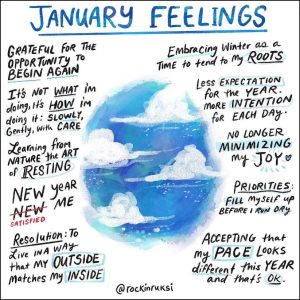
The rush of the holidays, the bleary-eyed return to work and school, the dark and damp that is January. With January the thoughts of a new year ahead abound, a clean slate, and perhaps the push to resolve to be better, fitter, cleaner, tidier, more organized, less cluttered, etc. We see this in popular culture, product ads, books, TV, and movies. Try this new life hack! Purchase this new gym membership! New year, new you! Asking so much of ourselves so quickly after exhausting ourselves with holiday events and obligations seems like a lot and doesn’t set ourselves up for success. What if we didn’t put these huge expectations on ourselves? What if, instead, we made a case for rest?
Follow Nature
If you look to nature, you’ll find the majority of plants don’t bloom in January (yes, #notallplants, but stick with me). The earth closes in on itself and rests when the sun is at its weakest in our sky. Plants instead turn to their roots, focusing on firming their hold in the ground so that when the sun strengthens, the days lengthen, they can push through the earth to grow again. Instead of pushing all these wild expectations on ourselves to change or reinvent, perhaps we take a tip from nature: focus inward. In order to grow or change, our roots — the core of our being — must be firmly grounded. A tree will only topple, if its roots aren’t deep and strong. The same with each of us. We must be grounded and have firm roots before we can successfully grow.

Rest and Restoration
Rest is how we give our bodies and minds time to recuperate from work. Rest and recharge look different to each person, depending on their needs. Rest could be solitary or social, depending on your intro- or extroversion.
Rest could look like:
- more sleep,
- opting out of going out,
- journaling, or
- reading.
Rest could also look like:
- connection,
- checking in with folks and making plans,
- video gaming, or
- deep-diving into new topics.
Restoration is about recharging our energy to get going again. One person’s recharge may look super busy: cleaning their closets, or reorganizing their space. Another person’s may look very physical: sweaty workouts at the gym, long hikes in the woods, or daily neighborhood walks. And still others, who take a traditional approach to recharge: creating solid bedtime routines, and quiet evenings at home. Recharging gives us back the energy to get back at it and keep going.
Rest and recharge go hand in hand for overall physical and mental wellbeing. Both are resilience skills that take time to understand for ourselves and to master.
My Inspiration
Feelings: A Story in Seasons by Manjit Thapp
Much of my personal interest recently for rest comes from Manji Thapp’s graphic novel Feelings: A Story in Seasons, which follows a young artist as they grapple with the prevalent feelings tied to each of the seasons in a year. The biggest revelation being that maybe humans need rest when the nights are longer just as plants do. I found this book calming and meditative. It encourages mindfulness of emotion and feelings, not to dwell or wallow, but simply to notice and acknowledge, feel without shame or judgement, and let it pass.
Additional Reading
TIROC Blog Series
This blog is part of a series that will focus on being trauma-informed and resilience-oriented as part of the Library's efforts to embrace the TIROC principles in our interactions with you and with ourselves.



Add a comment to: TIROC: A Case for Rest